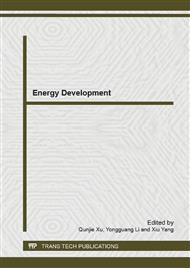[1]
SHANG Jin-cheng, LIU Zhi-du"Coordination theory of energy-saving generation dispatch and its application" Electric Power Automation Equipment, Vol. 29, No6, 109-114, (2009).
Google Scholar
[2]
WEN Li-li, LIU Jun-yong"Monte Carlo simulation of medium and long-term generation plan in hybrid power system based on environmental/economic dispatch"Power System Protection and Control, Vol. 36, No24, 24-29, (2008).
Google Scholar
[3]
ZHAO Wei-xing, LIN Cheng, SUN Bin" Study on economic dispatch method of the optimal composite coal loss under security constraints" Power System Protection and Control, Vol. 38, No9, 18-22, (2010).
Google Scholar
[4]
SHANG Jin-cheng"Generation right exchange theory and its applications based on energy-saving and emission-reducing (part one): generation right exchange theory" Automation of Electric Power Systems, Vol. 33, No12, 46-52, (2009).
Google Scholar
[5]
SHANG Jin-cheng, HE Yang. Generation right exchange theory and its applications based on energy-saving and emission-reducing (part two): generation right exchange analysis and applications[J]. Automation of Electric Power Systems, Vol. 33, No13, 37-42, (2009).
Google Scholar
[6]
FAN Yu-hong, ZHANG Wei, HAN Wen-chang, et al. Research on energy-saving generation dispatching model in regional grid considering bidding mechanism[J]. Power System Protection and Control, Vol. 37, No18, 83-88, (2009).
Google Scholar
[7]
SHANG Jin-cheng"Research on economic compensation mechanism for energy-saving generation dispatch (part one): design and analysis of economic compensation mechanism based on administrative means"Automation of Electric Power Systems, Vol. 33, No2, 44-48, (2009).
Google Scholar
[8]
SHANG Jin-cheng"Research on economic compensation mechanism for energy-saving generation dispatch (part two): design and analysis of economic compensation mechanism based on market mechanism" Automation of Electric Power Systems, Vol. 33, No3, 46-50, (2009).
Google Scholar
[9]
ZHOU Wei-qing, QIAO Zong-liang, SI Feng-qi" Multi-objective load optimal dispatch and decision- making guidance of power plant"Proceedings of the CSEE, Vol. 30, No2, 29-34, (2010).
Google Scholar
[10]
WANG Jian-xue, WANG Xi-fan, ZHANG Xian"Interruptible load management in power market and interim system part I: cost-benefit analysis of interruptible load" Electric Power Automation Equipment, Vol. 24, No5, 15-19, (2004).
Google Scholar
[11]
DUAN Ning, GUO Ting-zheng, SUN Qi-hong" Development and enlightenmentof pollutant generation and discharge coefficients at home and abroad"Research of Environmental Sciences, Vol. 22, No5, 622-626, (2009).
Google Scholar


